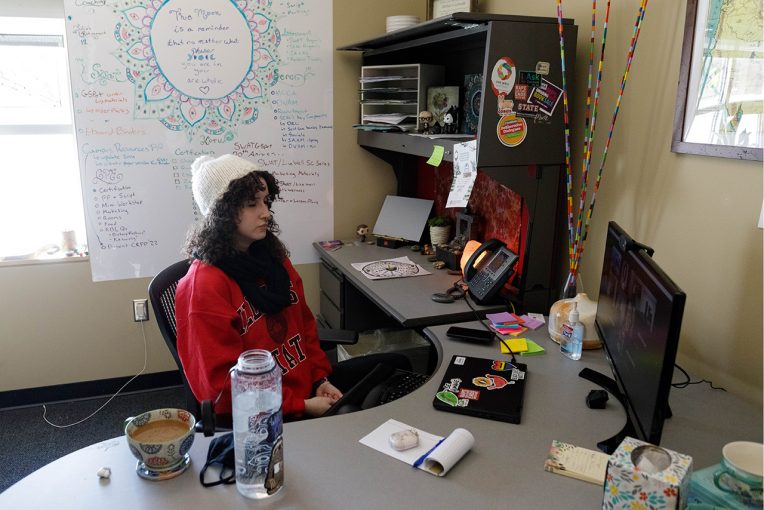Illinois State students have reported that stress and anxiety are two of the biggest factors impacting their academic performance. Fortunately, the University’s Health Promotion and Wellness unit provides several resources to improve Redbirds’ sense of well-being.
From coaching sessions to deep-breathing meditation, Health Promotion and Wellness assists students in overcoming obstacles they face.
“Something we’ve seen is more students reporting struggles with different aspects of mental and emotional health,” said Jim Almeda, M.S. ’02, coordinator of assessment and well-being initiatives in Health Promotion and Wellness. Almeda is also a certified health and wellness coach with the National Board for Health and Wellness Coaching.
Alongside his colleagues, Almeda works to make sure Illinois State students have access to the many programs available to those looking to improve their well-being. The following are just a few of the free resources available to students.
1. Wellness coaching
Introduced to campus two years ago, wellness coaching provides students with an opportunity to reflect on their experiences and develop strategies for success. During a session, students meet one-on-one with a certified wellness coach to discuss their goals regarding their well-being, and identify how they can work to achieve them.
“What we do is work with them to tap into their strengths to help them see what they’re capable of doing, and to create a plan for helping them to figure out what their vision is for their well-being and a roadmap for getting there,” Almeda said. “We, as the coaches, try not to tell them what we think they should do. Instead, we really work with them to help identify things that they think they’re capable of doing and willing to do that’s going to work for them.”
Coaching sessions are typically 30-60 minutes long, with their frequency determined by a student’s needs.
2. Koru mindfulness and meditation
Mindfulness consists of the acknowledgment and acceptance of one’s thoughts, feelings, and bodily state. The Koru mindfulness curriculum was designed specifically for college students to help them overcome challenges commonly faced by young adults. The research-based program, developed by Duke University, focuses on gratitude and “being in the moment.”
During four weekly sessions, each about an hourlong, students are led through meditation and mindfulness techniques. This practice allows for an increased awareness of one’s present-moment thoughts and feelings, and thus the practice of mindfulness.
The Koru 2.0 program offers four additional sessions that will further extend students’ learning. “We’ve seen people who, over the eight weeks really notice some significant changes,” Almeda said. “They may not be experts in mindfulness and meditation, but they are using it enough where they’re finding that it can help their overall well-being.”
3. Learning and growing as a group
Facilitated by the Health Promotion and Wellness staff, workshops are a great option for students and faculty who are looking to both learn and share information on improving their well-being. This resource is one often utilized by registered student organizations (RSOs) that wish to educate members on certain topics pertaining to student success and wellness.
Specific workshop content varies but topics can range from nutrition to workspace organization. For mindfulness and stress alleviation, the staff offers “Managing Your Stress by Being More Mindful,” a workshop in which participants will learn about and discuss stress factors, coping techniques, and self-care strategies.
Interested groups should determine which workshop best suits their needs, and submit a request with a preferred date, time, and location, and an alternate date time and location at least two weeks in advance.
4. LIVE WELL with Eight at State
The Eight at State initiative approaches maintaining one’s well-being by placing emphasis on the eight dimensions of wellness: emotional, environmental, financial, intellectual, physical, social, spiritual, and vocational. The initiative’s LIVE WELL program is an offshoot of this belief.
The incentive-based program is designed to hold students accountable in terms of healthy living. Upon joining the program students will log their day-to-day activities as they align with one or more of the eight dimensions of wellness. Entering activities awards students points that will go towards rewards and monthly challenges.
The goal of this program is to encourage students to form healthy habits and motivate them to take part in them as regularly as they can. After just the first 10 activities are logged, participants are eligible to receive a LIVE WELL T-shirt or stone coaster.

5. Wellness in the palm of your hand
WellTrack is an app with functions similar to the LIVE WELL program, offering a virtual workshop alternative for students who may be unable to fit wellness classes into their schedules.
The self-guided program can be used to address stress, anxiety, and depression. After an initial wellness assessment, users are provided with information and courses tailored to their specific needs. In the app students can enroll in cognitive behavior courses, track their moods, engage in regular reflections, and take wellness assessments to track progress.
The app, paid for by Student Counseling Services, Student Health Services, Health Promotion and Wellness, and Campus Recreation, is available to all students, staff, and faculty members at Illinois State.
In addition to the resources above, Health Promotion and Wellness also sponsors the Student Wellness Ambassador Team and PAWSitively Stress Free therapy dog visits.
“There are multiple factors that impact people’s wellness, and when you think about all those issues, they’re kind of interrelated, right? So if you’re not sleeping well, you’re not going to be resilient. If you’re not taking time for yourself for self-care, it may be hard for you to sleep well at night,” Almeda said. “We have some programs, though, that can help students get started and take some steps that may go a long way towards helping them in navigating all those different factors.”


